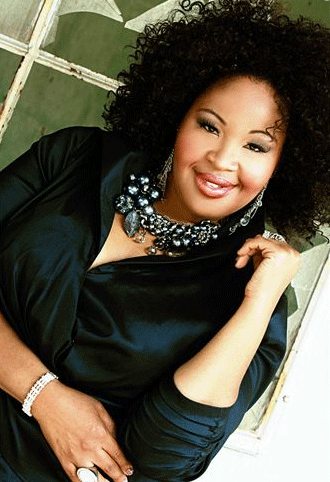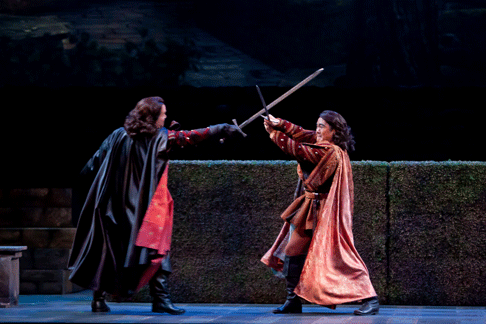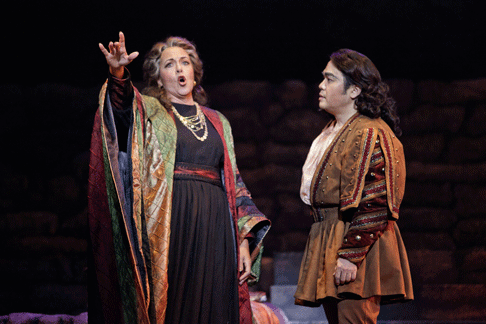
11 Mar 2013
Il Trovatore at Arizona Opera
Giuseppe Verdi and his librettist, Salvatore Cammarano, based the opera on Antonio García Gutiérrez’s Spanish play El Trovador.
English Touring Opera are delighted to announce a season of lyric monodramas to tour nationally from October to December. The season features music for solo singer and piano by Argento, Britten, Tippett and Shostakovich with a bold and inventive approach to making opera during social distancing.
This tenth of ten Live from London concerts was in fact a recorded live performance from California. It was no less enjoyable for that, and it was also uplifting to learn that this wasn’t in fact the ‘last’ LfL event that we will be able to enjoy, courtesy of VOCES8 and their fellow vocal ensembles (more below …).
Ever since Wigmore Hall announced their superb series of autumn concerts, all streamed live and available free of charge, I’d been looking forward to this song recital by Ian Bostridge and Imogen Cooper.
Although Stile Antico’s programme article for their Live from London recital introduced their selection from the many treasures of the English Renaissance in the context of the theological debates and upheavals of the Tudor and Elizabethan years, their performance was more evocative of private chamber music than of public liturgy.
Evidently, face masks don’t stifle appreciative “Bravo!”s. And, reducing audience numbers doesn’t lower the volume of such acclamations. For, the audience at Wigmore Hall gave soprano Elizabeth Llewellyn and pianist Simon Lepper a greatly deserved warm reception and hearty response following this lunchtime recital of late-Romantic song.
For this week’s Live from London vocal recital we moved from the home of VOCES8, St Anne and St Agnes in the City of London, to Kings Place, where The Sixteen - who have been associate artists at the venue for some time - presented a programme of music and words bound together by the theme of ‘reflection’.
'Such is your divine Disposation that both you excellently understand, and royally entertaine the Exercise of Musicke.’
‘And there was war in heaven: Michael and his angels fought against the dragon; and the dragon fought and his angels, And prevailed not; neither was their place found any more in heaven … that old serpent … Satan, which deceiveth the whole world: he was cast out into the earth, and his angels were cast out with him.’
There was never any doubt that the fifth of the twelve Met Stars Live in Concert broadcasts was going to be a palpably intense and vivid event, as well as a musically stunning and theatrically enervating experience.
‘Love’ was the theme for this Live from London performance by Apollo5. Given the complexity and diversity of that human emotion, and Apollo5’s reputation for versatility and diverse repertoire, ranging from Renaissance choral music to jazz, from contemporary classical works to popular song, it was no surprise that their programme spanned 500 years and several musical styles.
The Academy of St Martin in the Fields have titled their autumn series of eight concerts - which are taking place at 5pm and 7.30pm on two Saturdays each month at their home venue in Trafalgar Square, and being filmed for streaming the following Thursday - ‘re:connect’.
The London Symphony Orchestra opened their Autumn 2020 season with a homage to Oliver Knussen, who died at the age of 66 in July 2018. The programme traced a national musical lineage through the twentieth century, from Britten to Knussen, on to Mark-Anthony Turnage, and entwining the LSO and Rattle too.
With the Live from London digital vocal festival entering the second half of the series, the festival’s host, VOCES8, returned to their home at St Annes and St Agnes in the City of London to present a sequence of ‘Choral Dances’ - vocal music inspired by dance, embracing diverse genres from the Renaissance madrigal to swing jazz.
Just a few unison string wriggles from the opening of Mozart’s overture to Le nozze di Figaro are enough to make any opera-lover perch on the edge of their seat, in excited anticipation of the drama in music to come, so there could be no other curtain-raiser for this Gala Concert at the Royal Opera House, the latest instalment from ‘their House’ to ‘our houses’.
"Before the ending of the day, creator of all things, we pray that, with your accustomed mercy, you may watch over us."
The doors at The Metropolitan Opera will not open to live audiences until 2021 at the earliest, and the likelihood of normal operatic life resuming in cities around the world looks but a distant dream at present. But, while we may not be invited from our homes into the opera house for some time yet, with its free daily screenings of past productions and its pay-per-view Met Stars Live in Concert series, the Met continues to bring opera into our homes.
Music-making at this year’s Grange Festival Opera may have fallen silent in June and July, but the country house and extensive grounds of The Grange provided an ideal setting for a weekend of twelve specially conceived ‘promenade’ performances encompassing music and dance.
There’s a “slide of harmony” and “all the bones leave your body at that moment and you collapse to the floor, it’s so extraordinary.”
“Music for a while, shall all your cares beguile.”
The hum of bees rising from myriad scented blooms; gentle strains of birdsong; the cheerful chatter of picnickers beside a still lake; decorous thwacks of leather on willow; song and music floating through the warm evening air.

Giuseppe Verdi and his librettist, Salvatore Cammarano, based the opera on Antonio García Gutiérrez’s Spanish play El Trovador.
It’s important to realize that the play sets the time of the action in the fifteenth century, the time of Ferdinand and Isabella, and of Columbus. Beliefs, customs, and relationships were very different then. People believed that a witch could make you sick by giving you the evil eye. It was an age when few lived beyond the age of forty. Women had almost no rights and more than thirty percent of children died before the age of four. Aspects of the plot that may seem outlandish now, were quite real in the fourteen hundreds.
Unfortunately, Cammarano died before completing his libretto. Verdi then took over revising it and asked Leone Emanuele Bardare to finish it. In doing so, he added a great deal to the leading soprano part. On 19 January 1853 the opera was premièred at the Apollo Theater in Rome. Rigoletto had been a tremendous success in 1851 and Il trovatore was Verdi’s next blockbuster. It swept through European musical capitals like wild fire. By 1855 it was being performed at the recently opened Academy of Music in New York and at Covent Garden in London. Two years later L’Opéra staged Verdi’s Paris version of the opera with a newly written ballet scene.
 Count (Malcolm MacKenzie) duelling with Manrico (Dongwon Shin)
Count (Malcolm MacKenzie) duelling with Manrico (Dongwon Shin)
On 2 March 2013 Arizona Opera presented a traditional production of Verdi’s Il trovatore directed by John Hoomes at Symphony Hall in Phoenix. Actually, since a brand new rear projection screen supplied much of the scenery, it only looked traditional. Technically, it was up to the minute even though the audience was looking at Projection Designer Douglas Provost’s glorious images of fifteenth century Spain.
The first character heard in the opera is the soldier, Ferrando, recounting important background information. When a play is made into an opera only one-third of the dialogue can be used so someone has to recount some of the story. Director Hoomes saw to it that we always knew what was happening. Verdi made that bit of history into a catchy aria and Peter Volpe sang it with vigorous bronze tones. Karen Slack, who sang Leonora, the much fought over heroine, has a voluptuous soprano voice with silvery top notes and a formidable chest register. She seemed to throw care to the winds as she successfully navigated her music’s many pitfalls. The result was an exciting performance of this difficult role. Dongwon Shin was an energetic troubadour with a warm tenor voice, naturally musical phrasing and more than enough squillo for ‘Di quella pira’. He excelled in a role that few tenors attempt, so it’s no wonder that he has sung it in many cities.
 Azucena (Mary Phillips) and Manrico (Dongwon Shin)
Azucena (Mary Phillips) and Manrico (Dongwon Shin)
Mary Phillips had an amazing grasp of the role of Azucena. Verdi himself told us that she was not crazy, but her actions are that of a very troubled woman. These days we might blame it on traumatic stress resulting from having seen her mother’s fiery execution. Phillips made her real and totally believable, both when she showed her love for her presumed son and when she spat like a caged animal during her capture. Phillips colored her opulent mezzo-soprano voice with the myriad textures of this dramatic part. Some of the best singing in this delightful performance came from the villain, Count di Luna, portrayed by Malcolm MacKenzie. He phrased with great artistry and his sound was pure gold. He will be in Murder in the Cathedral at San Diego Opera later this month.
As Inez and Ruiz, Bevin Hill and David Margolis handled their parts with ease and added considerably to this excellent performance. Henri Venanzi’s chorus sang with ardor and commitment. Their ‘Anvil Chorus’ rang with stunning harmonies punctuated by the blows on a two toned anvil. Joel Revzen was the conductor who held everything together for this excellent performance. With a brisk, light approach, he gave a propulsive account of the score that pushed forward with relentless power.
Maria Nockin
Cast and production information:
Manrico, Dongwon Shin; Leonora, Karen Slack; Count di Luna, Malcolm Mackenzie; Azucena, Mary Phillips; Ferrando, Peter Volpe; Ruiz, David Margulis; Inez, Bevan Hill. Arizona Opera Chorus and Orchestra; Conductor, Joel Revzen; Chorus Master, Henri Venanzi. Scenic Design, Lighting Design, and Projections, Douglas Provost. Costumes, AT Jones and Sons. Fight Director, Andrea Robertson.